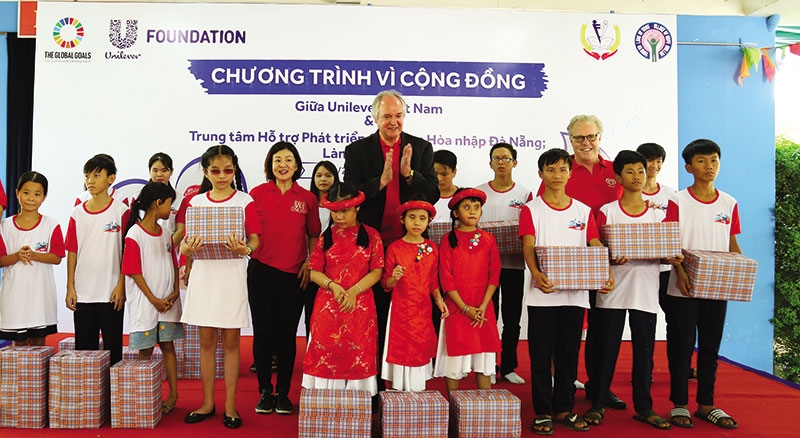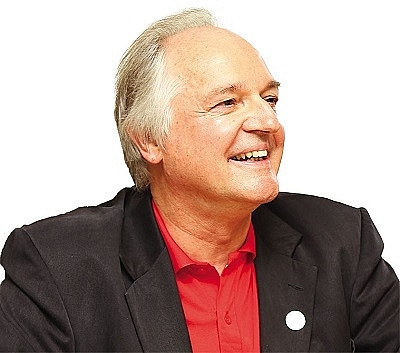Unilever makes sustainability count
 |
| During its decades of development, Unilever has always pursued the benefit of communities |
What brings you to Vietnam?
 |
| Paul Polman |
I try to visit as many of the countries Unilever operates in as frequently as I can. This is where you really learn the most, experiencing what markets are doing well, and what they may be finding challenging. This trip has also coincided with the Sixth Global Environment Facility Assembly, which Vietnam is hosting. I attended the GEF Assembly and discussed the urgent need for a fundamental transformation in key economic systems to deliver a more sustainable food and land use system. The world produces enough food to feed everyone, yet there are still 870 million people who go to bed hungry every night. Frustratingly, this doesn’t need a simple redistribution solution, but a total system change. It was an inspiring day and I’m confident we moved the agenda forward.
I was very pleased to be here as Unilever is committed to improving access to sustainable nutrition and sustainable operating practices. This is a part of our Unilever Sustainable Living Plan (USLP). The USLP is our blueprint for how we do business and it was a radical plan when we launched it in 2010. It sets out how we will decouple our growth from our environmental footprint, while increasing our positive social impacts. Unilever today has sustainability embedded squarely in the heart of our operations.
The USLP has been implemented globally since 2010. What are the plan’s biggest achievements, especially in Vietnam?
As I have mentioned, businesses have a responsibility to protect our planet for future generations. Unilever is strongly committed to sustainability and it is the core of our business model. Our USLP has three big goals to achieve, which are: (i) Help more than 1 billion people take action to improve their health and well-being; (ii) Halve the environmental footprint of the production and use of our products; and (iii) Enhance livelihoods of millions of people. Seven years after the launch of USLP, we have proven that sustainability drives growth while helping reduce the environmental footprint and increase social impact. In Vietnam, I am proud of the outstanding results Unilever has achieved across the three key pillars. We have helped to improve health and wellbeing for more than 20 million people in Vietnam, including 9.4 million people reached through hand-washing with soap education and free soap giving; 6.6 million people reached through oral care education, free dental check-ups, and treatment by P/S; and 4.5 million people reached through sanitation education by VIM. Regarding our goal to reduce our environmental impact associated with the making and use of our products by half, we reached a 99-per-cent reduction in carbon dioxide (CO2) emissions per tonne of production and a 42-per-cent reduction of water usage per tonne of production since 2011. In addition, all manufacturing hubs now send zero waste to landfills as of 2015. At the same time, we have reached over 33.6 million Vietnamese people through our Comfort One Rinse fabric conditioner, helping them to save 636 million cubic metres of water since 2011. Last but not least, we have enhanced livelihoods for millions of people in Vietnam through partnerships with the Vietnam Women’s Union and ministries, helping nearly 45,000 local households get access to micro financial loans worth VND300 billion ($13.33 million) for them to improve their incomes and enabling 1.3 million women to receive training on capability building and nutrition.
How has sustainable development impacted Unilever’s business performance?
Our sustainable business model has proven to be financially robust. It’s simple
economics. As the global economic, political, and societal environment becomes more disruptive, driving long-term value for our shareholders, consumers, and employees becomes increasingly important and more challenging. That’s why our Sustainable Living Plan is our key differentiator to drive growth, reduce cost, lower risk, and build trust.
Our USLP lowers our risk. Operating sustainably helps us to future-proof our supply chain against the risks associated with climate change, water scarcity, and long-term uncertainty of raw materials resources. It also reduces costs. For example, by using less energy, we have avoided energy costs in our factories. Since 2012, our cumulative cost savings from energy-efficient manufacturing and packaging management in Vietnam has exceeded nearly 100 million euros ($116.75 million).
The USLP also builds trust and helps us maintain our value and relevance to consumers, while inspiring Unilever’s current and future employees. Since 2013, Unilever Vietnam has been ranked first among the 100 best places to work for four consecutive years. And finally, we know it drives growth. Our Sustainable Living brands in Vietnam delivered much of our growth and grew faster than the rest of our business in 2017.
Climate change is escalating globally, and Vietnam is joining the world’s fight against it. What are Unilever’s contributions to the country’s efforts?
Climate change is threatening the entire globe. If temperatures rise by only two degrees Celsius, flooding and droughts will become fiercer. Vietnam is not an exception. Climate change has been causing water shortages in the lower reaches of the Mekong River, which has been negatively affecting the arable land, impacting people’s livelihoods.
Vietnam has actively partaken in the international community’s fight against climate change by focusing on economic growth without adversely affecting the environment and worsening climate change. The same is true for Unilever. In the USLP, we have set the target to reduce the environmental impact associated with the making and use of our products by half.
Unilever has also made a commitment to ensure our plastic packaging is 100 per cent reusable, recyclable or compostable by 2025.
To realise this commitment in Vietnam, Unilever is closely collaborating with the Vietnam Chamber of Commerce and Industry and a number of businesses to establish the Vietnam Centre for Circular Economy and pioneers the project Zero Waste to Nature, which builds a sustainable business model for plastic waste management to limit the use of plastics in production, as well as to reuse and recycle plastics. This would help reduce impacts on the environment and production costs for enterprises.
What has impressed you most about Unilever Vietnam’s success?
What has impressed me most is that our activities have had positive impacts on a large part of Vietnam’s population. Vietnam has more than 90 million people, more than 20 million of whom have benefited from our programmes on health, hygiene, and sanitation. That’s a great achievement for a single company and we take pride in it.
Secondly, I’m impressed by how Unilever Vietnam has helped introduce sustainable business practices to businesses, such as green energy factories that discharge no solid waste into the environment or sustainable living brands’ programmes that not only create positive social impacts, but also help drive growth. We have become a role model in doing sustainable business that prompted many other companies to follow.
And finally, I’m impressed by the strategic long-term partnership between Unilever Vietnam and governmental agencies on various programmes that helps drive transformational change, create social impacts, and enable development of both sides.
Unilever’s successes are also those of Vietnam. The above-mentioned 20.5 million people that had their living conditions improved are a vivid example of great social impacts that a public-private partnership can bring about.
What role do you expect Unilever Vietnam to play for Unilever?
Vietnam is a large market with huge potential. Vietnam has also been one of our fastest-growing markets. Thus, strategically, Unilever Vietnam is a very important market in the Unilever ecosystem. Interestingly, Unilever Vietnam can export talents and ideas. Many Vietnamese people are now working for Unilever globally and many new business initiatives of Unilever Vietnam are now learned by other markets. I can say I am very proud to see Unilever has grown into a leading and successful business, deeply rooted in the economy and society of Vietnam.
What the stars mean:
★ Poor ★ ★ Promising ★★★ Good ★★★★ Very good ★★★★★ Exceptional
 Tag:
Tag:
Related Contents
Latest News
More News
- Vietnam Television launches third 'Song Sau Lu' project for 2025 (December 15, 2025 | 08:00)
- Closing workshop highlights five-year impact of Fair for All project (December 12, 2025 | 16:22)
- Stakeholders mobilised before new child safety rules take effect (December 10, 2025 | 09:00)
- Vietnam receives emergency international relief as regional flooding intensifies (December 04, 2025 | 15:11)
- AmCham scholarships awarded to students (December 02, 2025 | 16:46)
- Vietjet flights carry love to devastated central region (November 28, 2025 | 11:35)
- SCG Sharing the Dream supports Vietnam’s youth and sustainable development goals (November 28, 2025 | 10:55)
- Siemens Caring Hands donates $34,700 for disaster relief in Vietnam (November 26, 2025 | 20:25)
- Ireland extends support for the Resilience First initiative (November 26, 2025 | 15:24)
- South Korea funds IOM relief for Vietnam’s typhoon-affected communities (November 24, 2025 | 15:33)






















 Mobile Version
Mobile Version